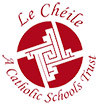Subjects offered
English, Irish, Maths, French, IT, Business, Music, Home Economics, Physical Education, SPHE, Religion, Geography, History.
The New Junior Cycle is being rolled out on a phased basis, having began with English in 2015. Since then, more subjects have been added each year, and presently English, Science, Business Studies, Irish, Modern Languages, Art, Maths, Home Economics, History and Music have are all being rolled out. By 2022, all Junior Cycle Subjects will be following the new curriculum.
The Framework contains 24 statements of learning, underpinned by the eight principles, provide the basis for schools to plan for, design and evaluate their junior cycle programmes. That process of planning focuses on the combination of curriculum components (subjects, PLU’s, and short courses) and other learning experiences. Schools will ensure that all statements of learning, alongside the key skills feature in the programmes of all junior cycle students.
The Principles
Eight principles underpin the Framework for Junior Cycle. These principles will inform the planning for as well as the development and the implementation of the Junior Cycle programmes in our school.
1) Learning to Learn: High quality curriculum, assessment, teaching and learning support students in developing greater independence in learning and in meeting the challenges of life beyond school, of further education, and of working life.
2) Choice and Flexibility: The school's junior cycle programme is broad enough to offer a wide range of learning experiences to all, and flexible enough to offer choice to meet the needs of students.
3) Quality: All students experience a high quality education, characterised by high expectations of learners and the pursuit of excellence.
4) Creativity and Innovation: Curriculum, assessment, teaching and learning provide opportunities for students to be creative and innovative.
5) Engagement and Participation: The experience of curriculum, assessment, teaching and learning encourages participation, generates engagement and enthusiasm, and connects with life outside the school.
6) Continuity and Development: Curriculum, assessment, teaching and learning enables students to build on their learning to date, recognises their progress in learning and supports their future learning.
7) Inclusive Education: The educational experience is inclusive of all students and contributes to equality of opportunity, participation and outcomes for all.
8) Wellbeing: The student experience contributes directly to their physical, mental, emotional and social wellbeing and resilience. Learning takes place in a climate focused on collective wellbeing of school, community and society.
The Key Skills
Through engaging with the key skills students will:
1) Be encouraged to problem solve and think critically and creatively
2) Have a critical engagement with digital technology
3) Take greater ownership of their learning
4) Be more actively engaged with learning
What is the difference between the New Junior Cycle and Junior Certificate?
The main differences between the New Junior Cycle and the old Junior Certificate are with the assessment and reporting aspects of the course.
Assessment across the Junior Cycle course will be on a continuous basis with students having a CBA (Classroom-Based Assessment) in both 2nd and 3rd Year and an Assessment Task(AT) in 3rd Year also. These CBAs will involve students completing assignments and research tasks across all subjects and will be facilitated and assessed by class teachers using a nationally agreed marking system designed by the National Council for Curriculum and Assessment (NCCA) .CBAs and ATs will be undertaken during a defined time period within normal class contact time and to a national timetable.
These CBAs will allow students to be awarded for work they complete throughout the course of the Junior Cycle, and not solely be awarded for their results from their final exam in the summer of 3rd Year.
Students are awarded a descriptor grade dependent on the quality of their work, which will appear along with their exam results on their Junior Cycle Profile of Achievement. This is the certificate that students will receive in September after their Junior Cycle Exams in June. Students are given 1 of the following grade descriptors for their CBAs:
● Exceptional
● Above Expectations
● In-line with Expectations
● Below Expectations
Another key difference in the New Junior Cycle is the change in the way grades are presented in the final exams. Students are now being awarded grade descriptors in place of the more traditional A, B, C grades.
Distinction 90 - 100%
Higher Merit 75 - 90%
Merit 55 - 74%
Achieved 40 - 54%
Partially Achieved 20 - 39%
Not Graded 0 - 19%
The reporting of results has also changed slightly. As mentioned above, students will now receive their Junior Cycle Profile of Achievement (JCPA) in September following their state exams in June. This JCPA will not only contain students’ exam results and CBA results, but will also feature a section where students can include Other Areas of Learning (OAL) that has taken place throughout their Junior Cycle. This section may include students involvement in extracurricular activities such as with team sports, school projects or charity work etc.
For more information
https://www.ncca.ie/en/junior-cycle
https://www.jct.ie/perch/resources/publications/jc-info-parents-post-primary-may-2017.pdf
https://www.ncca.ie/en/junior-cycle/framework-for-junior-cycle




